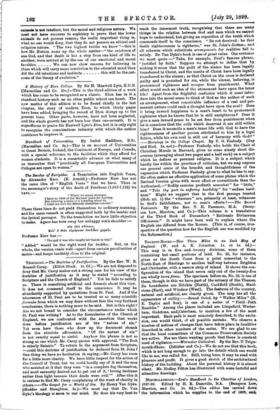THEOLOGY.—The Doctrine of Justification. By the Rev. W. B. Russell
Carey. (Elliot Stock. 1s. 6d.)—We are not disposed to deny that Mr. Carey makes out a strong case for his view of the doctrine of justification as it may be stated " according to Scripture and the Church of England." Yet he fails to satisfy us. There is something artificial and forensic about this view. It does not commend itself to the conscience. It may be abundantly supported by quotations from St. Paul. And if the utterances of St. Paul are to be treated as so many scientific formula from which we may draw without fear the very furthest conclusions, there is nothing more to be said. But is this right ? Are we not bound to consider the circumstances under which St. Paul was writing ? As to the formularies of the Church of England, we are confronted with the assertion that works done before justification are of the " nature of sin." Yet even here those who drew up the document shrank from the absolute affirmation. " Of the nature of sin" is not exactly equal to sinful. Anyhow the phrase is not so strong as one which Mr. Carey quotes with approval, "The flesh is utterly Satanic." To return to the argument from Scripture, —could this doctrine of justification be deduced from St. John ? One thing we have no hesitation in saying,—Mr. Carey has room for a little more charity. We have little respect for the action of the Council of Trent, but we could hardly say of it and the men who assisted at it that they were "in a complete fog themselves, and most earnestly desired not to get out of it, loving darkness rather than light because their deeds were evil.' " After this it is curious to find Mr. Carey complaining of the want of charity in others.—The Gospel for a World of Sin. By Henry Van Dyke. (Hodder and Stoughton. 5s.)—We must say that Dr. Van Dyke's theology is more to our mind. He does his very best to reach the innermost truth, recognising that there are many things in the relation between God and man which we cannot hope to understand, but giving an exposition of the truth which commends itself to the conscience. " Be not deceived : he that doeth righteousness is righteous," was St. John's dictum ; and all schemes which substitute arrangements for realities fail to satisfy. Dr. Van Dyke's book is one of great value. One sentence we must quote :—" Take, for example, Paul's famous phrase, justified by faith.' Suppose we attempt to define that by making it mean that the guilt of the sinner has been legally transferred to Christ, and the merits of Christ have been legally transferred to the sinner; so that Christ on the cross is declared guilty and is punished for sin, while the sinner, believing, is pronounced righteous and escapes from punishment. What effect would such an idea of the atonement have upon the inner life ? Apart from the frightful confusion which it must intro- duce into the moral sense to think of God as the author of such an arrangement, what conceivable influence of a real and per- manent nature could such a thought have upon the soul ? Does it bring inward happiness to a man's heart to be pronounced righteous when he knows that he is still unrighteous ? Does it give a man inward peace to be set free from punishment when he is conscious that the evils which deserved it are still within him ? Does it reconcile a man's inner life with God to have the righteousness of another person attributed to him by a legal fiction, while his own soul is still out of harmony with God ?" —Mornings in the College Chapel. By F. G. Peabody. (Gay and Bird. 6s. net.)—Professor Peabody, who holds the Chair of Christian Morals in Harvard, gives us some ninety short dis- courses (averaging about two pages and a half each) on a subject which he defines as personal religion. It is a subject which hardly lies within the province of criticism, but we may express our general sense of the breadth and thoughtfulness of the expression which Professor Peabody gives to what he has to say. He often makes an effective application of some phrase which the Revised Version gives with more effect or correctitude than the Authorised,—" Bodily exercise profiteth somewhat " for "little," and "Take thy part in suffering hardship" for "endure hard- ness." Might we suggest that in the first passage treated (Heb. xii. 1) the " witnesses" are, primarily at least, witnesses to God's faithfulness, not to man's efforts ?—The Sacred Vestments. By the Rev. T. H. Pasamore, M.A. (Samp- son Low, Marston, and Co.)—This volume is a translation of the Third Book of Durandus's " Rationale Divinorum Officiorum." It might have been well to explain where the English one differed from the Roman. (This is, of course, irre- spective of the question how far the English use was modified by the Reformation.)


































 Previous page
Previous page